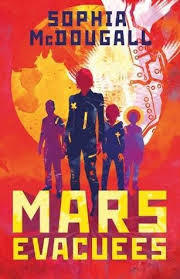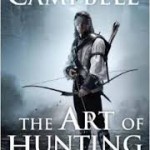Adrian Tchaikovsky's Blog, page 12
December 18, 2014
2015: Attack of the Release Dates
Very brief post to say: I have release dates for both of my novels coming out next year. Huzzah, I say.
Guns of the Dawn, my sort-of-Napoleonic/Regency fantasy, is being released on Thursday the 12th of February, and for the first time ever I will be in Forbidden Planet on the evening of that very day, signing books for all and sundry. Or possibly just sundry. I guess it would be expecting a bit much for all to turn up. No longer will I skulk like Gollum through the staff section to sign stock furtively, shying away from the prying torches of the deputy managers. I shall sign them openly, and in full view of the public. I'm not ashamed.
But yes, if you're a Londoner, or are for some reason passing through the Unreal City(1) on that evening, for Heaven's sake drop in and let me sign something for you. If I don't shift some books for them they'll lock me in with the Groppler again.
And! Children of Time, my beautiful SF novel, which I have just finished the final round of edits on, has been bumped up the list a bit, and will now be released on Thursday 4th June. Which, as I don't think anyone had any idea of the original release date, probably lacks impact as an announcement, but it's basically coming to you a month earlier than planned.
(1) Unreal city / Under the brown fog of a winter dawn / A crowd flowed over London Bridge, so many / I had not thought death had undone so many. TS Eliot, man. Goddamn Ts Eliot. More specifically, The Waste Land. That poem crops up crazily often in a certain kind of fantasy. Powers loves it. It's even referenced in Welcome to Night Vale. I studied it for A-level, and I loved it, but you know what? I was Reading It Wrong. Mr E would probably not have approved. I did not know the numerous languages he apparently assumed everyone fit to read his pome(2) should know. I did not get the allusions he was spinning, or at least had to have them explained to me by the teacher. I read it straight, with no allusions whatsoever, as a piece of spectacularly evocative weird-ass fantasy. I think he could just about maybe lived with, say, a respectable magical realism take, but in my head I did such unspeakable things to his work of literature. I mean, according to teacher, when he said, I will show you fear in a handful of dust, it was obviously a reference to Eliot's dislike of communism (3). To me it was just, like, Holycrapwhat? Fear in a handful of dust. That's some serious goddamn dust right there, Mr E. And that bit where the woman's talking to someone about her nerves being bad, in my head her interlocutor was some ghostly disembodied voice, some Ariel-style supernatural servitor/tormentor. Why? Because it's right there in the way it's written, if you're me and you're a fantasist and you have no allusions. That poem is a serious piece of grade A mind-blowing New Weird some seventy years ahead of its time, if only you lack the required education to appreciate it like what it was wrote for. Anyway, I digress.
(2) Yes, a typo, but I'm gonna leave it there. It gives a charming sense of brutish mispronunciation entirely apposite to the ignorance I'm exaggerating.
(3) The dust was red, you see.
Share this
December 11, 2014
The best of what's left of…
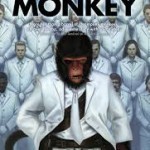
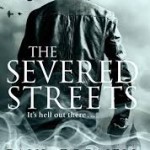
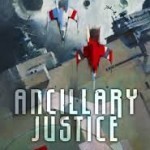 Like many author-bloggers, I do a year-end thing about books of 2014(1). I try to stay away from a "best of" list. I've posted through the year on books I liked, and what's best is very subjective based on when you read it and what is juxtaposed with it (2). Hence, I would direct you to my post here where I laud Powell's excellent Hive Monkey, Lyle's Alchemist of Souls, Jemisin's The Hundred Thousand Kingdoms, and in which — I see now — I mention being about to read Paul Cornell's Severed Streets, which I confirm is every bit as engaging a read as London Falling. I will also send you here where I recommend Collick's Thumb, Hurley's Mirror Empire, Hardinge's Cuckoo Song, the new Ian Watson collection from PS and Roberts' essays/reviews in Sibilant Fricative. Finally, there's my Clarke Awards post and, the dust having died down, I think my favourites from there are God's War by Hurley and… well… am I allowed to talk about the AI in the room? Leckie's Ancillary Justice, of all books, doesn't need my minuscule approbation, but it really was that good, and I very much enjoyed the sequel, Ancillary Sword, as well. So yes, I don't do a Best Of, but all those were very good. Also, many of them (and by default the Clarke shortlist) were not books published in 2014, to which I say, my blog, my reading schedule.
Like many author-bloggers, I do a year-end thing about books of 2014(1). I try to stay away from a "best of" list. I've posted through the year on books I liked, and what's best is very subjective based on when you read it and what is juxtaposed with it (2). Hence, I would direct you to my post here where I laud Powell's excellent Hive Monkey, Lyle's Alchemist of Souls, Jemisin's The Hundred Thousand Kingdoms, and in which — I see now — I mention being about to read Paul Cornell's Severed Streets, which I confirm is every bit as engaging a read as London Falling. I will also send you here where I recommend Collick's Thumb, Hurley's Mirror Empire, Hardinge's Cuckoo Song, the new Ian Watson collection from PS and Roberts' essays/reviews in Sibilant Fricative. Finally, there's my Clarke Awards post and, the dust having died down, I think my favourites from there are God's War by Hurley and… well… am I allowed to talk about the AI in the room? Leckie's Ancillary Justice, of all books, doesn't need my minuscule approbation, but it really was that good, and I very much enjoyed the sequel, Ancillary Sword, as well. So yes, I don't do a Best Of, but all those were very good. Also, many of them (and by default the Clarke shortlist) were not books published in 2014, to which I say, my blog, my reading schedule.
There are also a few books that, like the Leckie, I've not previously over-trumpeted because they already have a considerable orchestra going for them. Here are three that particularly impressed me this year, that you probably already have on your radar. If you haven't read them already, though, they certainly knocked me for six.
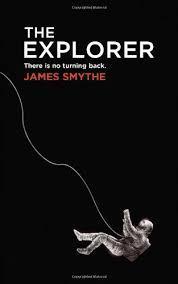 James Smythe's The Explorer came out with a cover and a release date serendipitously similar to the film Gravity, which did it no harm at all. However, to hell with such puffery! It is a very good book. Smythe's The Machine was a strong Clarke contender, and The Explorer is more of his claustrophobic, intensely psychological prose backed by profoundly mind-wrenching ideas. He also plays the weirdest game with pacing, at the book's start. You read the back-cover blurb, you think you have a handle on what the book's about, only to find that the first chapter races through the events referred to on the back, taking scarcely longer to do so, and then abandons you in the unknown. Which is fitting.
James Smythe's The Explorer came out with a cover and a release date serendipitously similar to the film Gravity, which did it no harm at all. However, to hell with such puffery! It is a very good book. Smythe's The Machine was a strong Clarke contender, and The Explorer is more of his claustrophobic, intensely psychological prose backed by profoundly mind-wrenching ideas. He also plays the weirdest game with pacing, at the book's start. You read the back-cover blurb, you think you have a handle on what the book's about, only to find that the first chapter races through the events referred to on the back, taking scarcely longer to do so, and then abandons you in the unknown. Which is fitting.
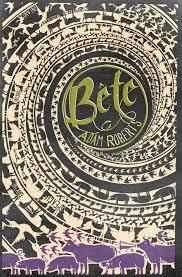 Adam Roberts, who somehow manages to put out book after book, write oodles of essays(3) and reviews and also, you know, hold down an academic career, has had two crackers out this year. Twenty Trillion Leagues Under The Sea is the Verne homage the title suggests but run through the diabolical wringer of Roberts' mind just as the Swift homage Swiftly was. However, the true Roberts gem this year for me was Bete, a what-if following the career of a cattle farmer in an England where the animals have been gifted with both sentience and legal rights. It's Animal Farm meets RUR, and it is one of the two top picks I have for the 2015 Clarkes.
Adam Roberts, who somehow manages to put out book after book, write oodles of essays(3) and reviews and also, you know, hold down an academic career, has had two crackers out this year. Twenty Trillion Leagues Under The Sea is the Verne homage the title suggests but run through the diabolical wringer of Roberts' mind just as the Swift homage Swiftly was. However, the true Roberts gem this year for me was Bete, a what-if following the career of a cattle farmer in an England where the animals have been gifted with both sentience and legal rights. It's Animal Farm meets RUR, and it is one of the two top picks I have for the 2015 Clarkes.
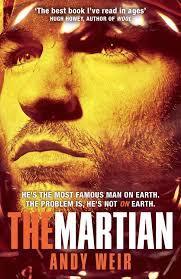 The other top pick would be Andy Weir's The Martian, which… well, blimey, it's possibly the most science-fictiony book I've ever read — specifically that pole of SF where the science is very hard. Astronaut is stranded on Mars, must improvise to survive. And he does, and Weir turns a story that could be hellishly dry (kind of like Mars) into a vastly entertaining, heart-capturing struggle against the odds. Expect a movie.
The other top pick would be Andy Weir's The Martian, which… well, blimey, it's possibly the most science-fictiony book I've ever read — specifically that pole of SF where the science is very hard. Astronaut is stranded on Mars, must improvise to survive. And he does, and Weir turns a story that could be hellishly dry (kind of like Mars) into a vastly entertaining, heart-capturing struggle against the odds. Expect a movie.
The main point of this post, however, is to talk about some books that are also very good, but deserve to be better known, and I have a few that haven't snuck onto any other posts this year.
First off, Mars Evacuees by Sophia McDougall. This is a young adult SF about a girl growing up during a war between Earth and an invading alien race determined to freeze the planet for their own habitation. The Earth situation is so bad, she is shipped out to Mars, which is where things get a whole lot worse. Mars Evacuees is an exceptionally intelligent SF novel, very funny. very well observed. The aliens get my seal of approval (4) and I am looking forward to the upcoming sequel keenly (especially as I've had some hints from Sophia as to what's in it). Most young adult SF I've seen, while often very good, is near-future dystopia stuff, and it's good to see some traditional interplanetary SF in the mix.
I also very recently read the third of Emma Newman's Split World books, All Is Fair, which continues the high standard of the previous two — I've already said how much of a fan I am of the series, but if you haven't given it a look yet, you should definitely pick up the first, Between Two Thorns, for some decidedly superior urban fantasy.
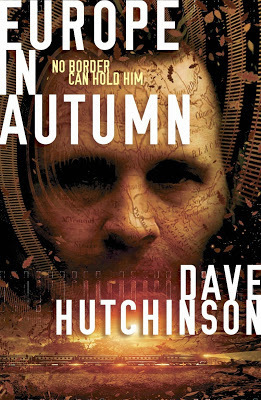 I have also read (One of Adam Roberts' recommendations, this) Europe in Autumn by Dave Hutchinson, which has recently appeared on the Guardian's Best-of list, but nuts to them, I read it first. It's a subtle, well-characterised story about an illicit courier in a fragmented near-future Europe, and one of the great joys is simply the narrator's voice itself, which is masterfully written. Mr Roberts gives this a far better rundown than I could, so you should check out his review here.
I have also read (One of Adam Roberts' recommendations, this) Europe in Autumn by Dave Hutchinson, which has recently appeared on the Guardian's Best-of list, but nuts to them, I read it first. It's a subtle, well-characterised story about an illicit courier in a fragmented near-future Europe, and one of the great joys is simply the narrator's voice itself, which is masterfully written. Mr Roberts gives this a far better rundown than I could, so you should check out his review here.
From earlier this year, I want to flag up The Art of Hunting by Alan Campbell, sequel to his Sea of Ghosts. This is a grim, twisted, high-magic fantasy world — it reminds me a bit of Erikson's Malazan series — pitting one bitter, scarred man against the sort of awe-inspiring, world-bending powers that would make Gandalf's beard fall out. I am a sucker for truly imaginative fantasy worlds, and Campbell's books have that in spades.
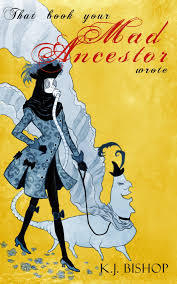 I was lucky enough to be on a panel with KJ Bishop at Loncon 3 — I've long been a fan of her book The Etched City, which is an exceptionally fine piece of fantasy writing (falling somewhere around the Mieville/Vandermeer continuum in general feel and topic, might I say? Probably that's a poor comparison). This year I found she had a collection of shorts out, called That Book Your Mad Ancestor Wrote, and it is delightful. Every story there is a gem.
I was lucky enough to be on a panel with KJ Bishop at Loncon 3 — I've long been a fan of her book The Etched City, which is an exceptionally fine piece of fantasy writing (falling somewhere around the Mieville/Vandermeer continuum in general feel and topic, might I say? Probably that's a poor comparison). This year I found she had a collection of shorts out, called That Book Your Mad Ancestor Wrote, and it is delightful. Every story there is a gem.
Last recommendation: Violent Century by Lavie Tidhar. Superhero novels are a thing now — I keep meaning to do a post about it. Adam Christopher has written some superb pulp/superhero books (Seven Wonders springs to mind) and there are a remarkable range of others — one feels that Temps and Soon I Will Be Invincible (still my favourite ever I think) were just ahead of the curve. Tidhar… Lavie has a window onto the events of the last century or so that few writers have. He is comfortable descending into the pits of history and focusing on them through his very unique lens. Violent Century is a spy-superhero-WWII story, and it is deep and hard-hitting and profoundly affecting.
(1) Which is gonna get old when I do it in December 2015
(2) This is my excuse for why I don't make many of those lists.
(3) not assays, as originally typed. Although probably he fits a few of those in as well.
(4) and like I was talking about with Dr Who, it's all about the aliens with me.
Share this
December 8, 2014
I am Dungeon Master…
Typing that quote from the old cartoon, it occurs to me that, if you’re a bunch of kids lost in a hostile and alien world, hearing that from a little bald gnome is probably more reassuring than from an enormous bearded guy.
Following up on my previous post about the release of D&D Next/5th Edition, I can now report that I have successfully run my first game of it, which is the first time I’ve sat down with a bunch of other human beings face to face and rolled dice in the name of dungeons and dragons for quite a few years.
Your daring party of adventurers for this epic quest were:
Paul Cornell as a gnome monk, aka tiny fists of fury! A gnome whose low Charisma manifested in his never using three words when thirty would do, most especially when making urgent scouting reports.
My agent, Simon Kavanagh as a chaotic evil wizard, whose dread plans to betray his fellows and take over the world were softened by his endearing tendency to fumble every single key dice roll in the worst possible way.
Simon Gilmartin as a half-elf rogue who was constantly scapegoated by the above evil wizard, and whose attempts to negotiate with goblins resulted in a string of inadvertent and horrifying slurs on their racial character.
Dominic White as the high elf paladin, meaning that he is Better Than You on two counts rather than just one. Also, owing to a low Dexterity and weight of armour, one who ended up leading primarily from the rear.
And it went… actually it went extremely well. Along the way we learned fun new things such as: it’s OK to punch your fellow adventurer in the face if you’re both standing in a holy healing pool; and that you can rout an entire enemy warband by using the Message cantrip to give them an internal monologue about how awesome the gnome is.
It’s been a good while since I drew up a map and a key and a set of monster stats cold, but we actually got it all done by home time. It was a sheer 100% slice of nostalgia for everyone concerned. I should get a chance to run a game for another group, composed of my wife and authors Emma and Peter Newman around New Year, and there will hopefully be a second outing for the above bunch of reprobates early next year too. And… who knows? Since the game got mentioned on Twitter there’s been quite a little stir of interest from other once-were-gamers. There’s been talk of pre-convention get-togethers and lord knows what. It’s not often you reach out to recapture a slice of your youth and it actually turns up pristine and shiny and as much fun as you remember.
Share this
November 12, 2014
Who Dunnits
For me, when I was a kid, there was one reason I watched Doctor Who. Not the TARDIS, not the Doctor, not even the time travel, but the monsters. Each storyline, the big thrill would be the monster reveal — sometimes terrifying, sometimes exhilarating, sometimes, er, disappointing (1). I loved the monsters; I wanted to know more about them as species in a wider universe. In just the same way, I liked the cantina creatures and the bounty hunters in Star Wars, and the lizard-man guy from Battle Beyond the Stars. And I'm not alone in feeling the rubbery pull of Who's vast assembly of adversaries. The show's expanded universe, which was the backbone of Who for all the long lean years between McCoy and Eccleston, has done a lot of exploring in the universe of the Time Lords, casting and recasting familiar faces and races in various lights. Below, though, I pen a few words giving my take on how some of the old favourites have fared since the show rematerialised on the small screen back in 2005. Oh — and spoilers for the most recent series, yes, even the last episode. Especially the last episode. Go watch that first, if you're gonna.
Bit Part Players
There are a whole load of cameos, one-episode call backs to beasties that mostly only got an episode back in the day — hard to draw much of a conclusion for most of them, but I will mourn the degeneration of the mind-controlling crab-monster Macra into glorified filter feeders (Gridlock). On the other hand the Ice Warriors, sometime allies as well as foes, got a nice star turn in Cold War and the Zygons even find a kind of redemption in The Day of the Doctor. Why do we love the Zygons so much, weird baby-proportioned bobble-heads that they are? I have no idea. I didn't even see the Loch Ness Monster episode, I only read the Target novellization, and I still loved the Zygons. Baffling.
Daleks
I don't need to do the Daleks, do I? Most iconic and long-running of all Who aliens — possibly one of the most alien, too — constantly reinvented and revised even during the currency of the original run, the new series has given them a variety of good outings, starting with Rob Shearman's excellent Dalek all the way to the recent Into the Dalek (2) (3). Daleks in the new run are basically more kickass than ever — after all they fought the actual Time Lords to a standstill, and arguably survived the Time War better than their enemies. OK, so they've had their hiccups. I wasn't mad on the United Colours of Dalek myself, but overall they're almost the poster child for an old Who adversary writ large in the new series.
Autons
I should say that my Who Fu is not impeccable, so I'm going to make some statements of fact that will be bitterly derided in the comments. So, the Autons were in… two stories from Pertwee's run, I think. Plastic men controlled by an ethereal space squid. What's not to love? A good choice for Ecclestone's first foe, a hark back to the old days without going over ground that was already too well trodden. And then we had the Roman Autons for that Pandorica business, which gave them realistic accessories and therefore kind of made them into the greatest action figures the world never had. Anyone else wish Rory had stayed on as an Auton? If nothing else it might have added an unending number of "toy boy" jokes to the Amy/Rory relationship…
Silurians
My favourites. Even though I never saw any Pertwee stories on the telly, still my favourites. I read the Target book by Malcolm Hulke (I think?) and fell in love. It might just have been that they were lizard men, a concept for which I've always had a soft spot. On the other hand it might have been that, in the book, they were given a whole lot of depth and characterisation. They weren't just about coming over here and invading our planet; they were about retaking their planet. It makes a lot of difference. Silurians seem to have been a big fan favourite in the expanded universe, and the generally sympathetic fan outlook surely informed their new outing in Hungry Earth/Cold Blood — I wasn't necessarily convinced that that story, as it was left, would lead to any human/Silurian detente, but the Silurian concept has gone on in leaps and bounds through the series — we've had Silurian ark-ships in space, and we've had the redoubtable Madame Vastra kicking butts and taking names. In all, the Silurians have had a more positive image shift than any of the old-style aliens. I still want to see a future-set story with a joint human/Silurian space colony (not as the focus of the story, but just because that's the future) but… well, who knows?
Sontarans
It's actually hard to top Linx, the original Sontaran from the Time Warrior. He might have been a bad guy, but he had a lot of style, and again, the Target book gave him considerable depth (Invisible Enemy was, I think, my first Who on TV — anything before that I knew from the books, and I read the books of ones I've watched too, so small wonder its those books that lodged in my mind). Kind of like Star Trek and various other SF properties, the universe of Who is basically full of an enormous number of genocidal warrior races, because that makes for a useful sort of story. It's a very limited characterisation, and yet the Sontarans have kind of followed a Klingon-style trajectory where psychopathy turns into warrior honour, and warrior honour turns them eventually from implacable foes into semi-comic friends. Or Strax, as he's known. Strax aside, I don't think his race get a better deal in the new than they did in the old, but then it's hard to to better than old Linx anyway.
The Master
The new series kind of has a hand tied behind its back here, because what it can't have is Roger Delgado. I wasn't quite caught by John Simm's Master, and although Michelle Gomez was superb, I think I kind of preferred the saturnine plotting Master to the Crazy-go-nuts vibe the new series has, and the more localised (aka low budget) evil of Pertwee's nemesis compared to the "I shall transform everyone on earth into a…" global threat of the new. But this, I think, is just me being old. Being old and loving the performance of Delgado. What're you gonna do?
Cybermen
Aaaaaand yes. Cybermen. I always liked the Cybermen. I love the old creepy Troughton-era undead-looking Cybermen, and I remember the box-headed guys that replaced them very fondly. I cried during Earthshock and I was kind of put off by the mass scenes of cybercarnage in Five Doctors. And then we have the new crop, in all their armoured shininess. Rise of the Cybermen/Age of Steel worked well with the alternative origin story (how many times have the cybermen arisen?) and although it didn't make much sense, I guess I can't really complain about the same hard-shelled look being standard every time they come back (although they seem less scary to me, when you make them that much more robot). But oh, of all the old bad guys, how the mighty have fallen! Poor cybermen, trash-talked by Daleks, and then they can't even convert James Corden because if you really really don't want to become a cyberman, that's apparently a trump card. Even when they go up against Capaldi, it's not really a Cyberman story; they're just an appendix to Missy's conquests. I know that there's some division over Gaiman's Nightmare in Silver (4), but imho that's been the only outing the poor bastards have had that's made them a credible galactic threat. Poor bloody cybermen. But then maybe they've had their day. Transhumanism is a thing now, in SF, after all. The idea of becoming a machine, of living eternal within cold steel and circuitry is something the genre no longer views with unalloyed (sorry) horror. Perhaps the idea of the evil unfeeling cyborg army is finally ready to be sealed in its tomb…
(1) Although some of the monsters that look most dodgy now were the most terrifying then. The stories I remember really scaring me include Invisible Enemy, Power of Kroll and Creature from the Pit.
(2) Not Journey to the Centre of the Dalek as I thought it was called all the way up to writing this.
(3) Which weirdly managed to be a shout-out both to Dalek and to Invisible Enemy.
(4) There is division over every single damn episode. After every Saturday that Capaldi was on I'd pop on FB and a different set of people would be declaring "Worst episode ever!" apparently at random.
Share this
November 3, 2014
A Shot in the Pods
So, I have discovered podcasts. This does not, I am aware, do much for my reputation as a global trend-setter. Actually, for the longest time I didn't even know what a podcast was. Coming from a Larping background I just assumed it was the thrown weapon equivalent of a pod shot.
 This development came from three directions at once, like atoms combining in a badly-researched children's science cartoon. I had been meaning to go and listen to all of Tea and Jeopardy ever since I was on it (of which see below) and, likewise, I was tapped to do a guest spot on another genre podcast (of which ditto), but mostly because when my iPhone updated it suddenly had a podcast icon that let me download podcasts. Before this, I was quite literally standing there, aware that podcasts existed and that people were enjoying them, holding a sophisticated communications device/player in my hand, and crying out to the universe "How? Damn you, How?". Because I'm somewhat sub-Batman when it comes to gadgeteering skills.
This development came from three directions at once, like atoms combining in a badly-researched children's science cartoon. I had been meaning to go and listen to all of Tea and Jeopardy ever since I was on it (of which see below) and, likewise, I was tapped to do a guest spot on another genre podcast (of which ditto), but mostly because when my iPhone updated it suddenly had a podcast icon that let me download podcasts. Before this, I was quite literally standing there, aware that podcasts existed and that people were enjoying them, holding a sophisticated communications device/player in my hand, and crying out to the universe "How? Damn you, How?". Because I'm somewhat sub-Batman when it comes to gadgeteering skills.
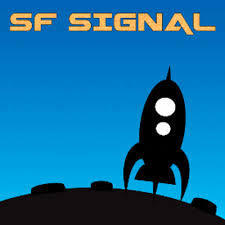 But now I am a grand convert of The Podcast, mostly because I abruptly clicked that I could listen to them during my commute (1) or just meandering on my way. Also, I made my first Hugos, and of course there was a podcasty category in it. And my life, there are a lot of good genre podcasts out there. Some are serious discussion shows and some are interview shows and some are very funny, and also do discussions or interviews. And some are just funny. I feel like Steve Rogers, seriously I do. I know everyone and their dog has been podcasting, or whatever the word is (2) since the dawn of the portable device age, and here I am running around being madly enthusiastic as though I've just discovered how to turn lead into gold (3).
But now I am a grand convert of The Podcast, mostly because I abruptly clicked that I could listen to them during my commute (1) or just meandering on my way. Also, I made my first Hugos, and of course there was a podcasty category in it. And my life, there are a lot of good genre podcasts out there. Some are serious discussion shows and some are interview shows and some are very funny, and also do discussions or interviews. And some are just funny. I feel like Steve Rogers, seriously I do. I know everyone and their dog has been podcasting, or whatever the word is (2) since the dawn of the portable device age, and here I am running around being madly enthusiastic as though I've just discovered how to turn lead into gold (3).
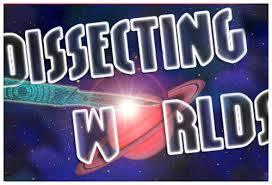 So: the plug — As well as doing that spot on Tea and Jeopardy, I was recently tapped by the guys at Dissecting Worlds, the Geek Syndicate podcast. This is one of the discussion podcasts — they're in their 9th season, and each season tackles a particular aspect of the written world and gives it a thorough going over. Previous seasons have looked at topics such as religion or alternate history, for example, and this current one is on espionage. They kicked off with Bond in a program that is enthusiastic about the popularity and tropes of Bond without remotely shying away from the very, very unpleasant aspects of Bond's written and cinematic character. And for a second instalment they look at espionage and politics in the world of Shadows of the Apt, with me along for the ride. It was great fun to record, and please do hop over and give it a listen. Or download it on your iPodermophone, like gramps here.
So: the plug — As well as doing that spot on Tea and Jeopardy, I was recently tapped by the guys at Dissecting Worlds, the Geek Syndicate podcast. This is one of the discussion podcasts — they're in their 9th season, and each season tackles a particular aspect of the written world and gives it a thorough going over. Previous seasons have looked at topics such as religion or alternate history, for example, and this current one is on espionage. They kicked off with Bond in a program that is enthusiastic about the popularity and tropes of Bond without remotely shying away from the very, very unpleasant aspects of Bond's written and cinematic character. And for a second instalment they look at espionage and politics in the world of Shadows of the Apt, with me along for the ride. It was great fun to record, and please do hop over and give it a listen. Or download it on your iPodermophone, like gramps here.
 There really are a lot of genre podcasts, and I've barely scratched the surface. A few I've tried that I can recommend are: SFSignal (literary discussion with author guests and Hugo awards), Verity (seriously in depth Dr Who discussion), Galactic Suburbia (genre issues, books & films discussion from the Antipodes) and Skiffy and Fanty (discussion and interview cast). As someone who grew up with radio comedy, though, I will profess a particular fondness for those that make me laugh, though. I know I've been on it, and I know the creators very well, and therefore I'm hardly a disinterested reviewer, but I cannot recommend Tea and Jeopardy highly enough. Every episode leaves me with the sense that I've really got to know that instalment's guest, and listening to the show made me feel a part of this mythical geek community that people talk about — but that so often turns into fog when you try and put any weight on it.
There really are a lot of genre podcasts, and I've barely scratched the surface. A few I've tried that I can recommend are: SFSignal (literary discussion with author guests and Hugo awards), Verity (seriously in depth Dr Who discussion), Galactic Suburbia (genre issues, books & films discussion from the Antipodes) and Skiffy and Fanty (discussion and interview cast). As someone who grew up with radio comedy, though, I will profess a particular fondness for those that make me laugh, though. I know I've been on it, and I know the creators very well, and therefore I'm hardly a disinterested reviewer, but I cannot recommend Tea and Jeopardy highly enough. Every episode leaves me with the sense that I've really got to know that instalment's guest, and listening to the show made me feel a part of this mythical geek community that people talk about — but that so often turns into fog when you try and put any weight on it.
 I've also — having been a longtime fan of their website and reviews — become a strong convert of the Shut Up And Sit Down podcast. I am not actually a great buyerof boardgames, being more a parasitical consumer of other people's, but Paul and Quinns and the rest are just really fun, pleasant people to spend ear-time with (4).
I've also — having been a longtime fan of their website and reviews — become a strong convert of the Shut Up And Sit Down podcast. I am not actually a great buyerof boardgames, being more a parasitical consumer of other people's, but Paul and Quinns and the rest are just really fun, pleasant people to spend ear-time with (4).
 And of course there's Night Vale. Because, seriously, the whole geek world was raving about that, and I was as one who was blind. But now I have cast the scales from my eyes, and seen the lights! The lights in the sky that were always there, but everyone pretends not to see…
And of course there's Night Vale. Because, seriously, the whole geek world was raving about that, and I was as one who was blind. But now I have cast the scales from my eyes, and seen the lights! The lights in the sky that were always there, but everyone pretends not to see…
(1) Yep, still with the day job.
(2) Podcastrating? Maybe not.
(3) For more on that topic, check out the History of Alchemy podcast. Because podcasts are achieving a Rule 34-like quality. If you can think of it, someone's done a podcast.
(4) Is that a thing? Now it's a thing.
Share this
October 26, 2014
Avengers: Age of Convention
Is just a cheap device to lure unwitting Marvel fans to the site, really. But I am super-pumped(1) by the Avengers 2 trailer that was either leaked or put out by Marvel or something, but whateverthehell, it looked good.
But yes, the end of an era: the Age of Convention is over. 2014 has been a mad year for going places and doing stuff, as I've said in far too much detail already, and this weekend gone I capped it off with my first Bristolcon. For novice con-spotters, Bristol's convention is a local gig, rather than the bigass national brouhahas like Eastercon, Fantasycon and, now, Nine Worlds. However, everything I've heard about it over the last few years suggested that it was a very enjoyable place to be, and that it was definitely On The Map for authors, and I can certainly give my thumbs up for that one. The superlative Emma Newman and Jon Courtenay Grimwood were author guests of honour this year, and both in fine form — Emma being interviewed by Gareth Powell was a particular highlight. I did a panel on steampunk in which, I rather recall, I got somewhat punchy and impassioned about Issues. Hmm. There was a good panel in writing the inhuman chaired by Peter Newman, and Jaine Fenn read out a superb little story which, I am told, is going to be in Fox Spirit's Wicked Women antho, to which I've also contributed. I even got to sign some books. And, of course, it was a last chance for 2014 to catch up with some good friends — Ian Whates, LM Myles the Noted Dr Who Authority, Paul Cornell, Anne-Mhairi Simpson and a whole load of other people.
Next year will hopefully be heavy with cons as well, if only because I have Guns of the Dawn and Children of Time (4) out, two completely fresh starts that I will have to put the self-publicity hat on for, no matter how badly it fits. I will be at Eastercon and Nine Worlds and Fantasycon, and there's a distinct possibility I might pitch up at Luxcon in Luxembourg as well. Another Bristolcon is a strong possibility, and, well… if you know of a con that is desperately lacking a large, bearded guy who won't shut up about spiders, then do drop me a line by Facebook or in the comments.
(1) Is that a thing that young people say? Does it mean what I think? Answers on a postcard please. Or possibly by the telegraph.(2)
(2) Small 't', not the newspaper. (3)
(3) You remember newspapers, right? They're the things that they used to serve fish and chips in before the internet.
(4) Formerly touted as Portia's Children.
Share this
October 4, 2014
More Good Work
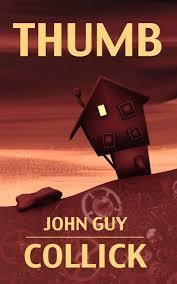 It's about time I talked about someone else for a change, so here is another set of books I've read and enjoyed, and feel should be better known.
It's about time I talked about someone else for a change, so here is another set of books I've read and enjoyed, and feel should be better known.
I came across John Guy Collick's Thumb (1) in a random Facebook exchange. You get a lot of books thrown around on FB, and many of them sound quite mad, and after a while that ceases to be much of an inducement to read them. Thumb does indeed sound quite mad, but a sufficiently refined and innovative strain of madness that I took the plunge and ordered it. Whereupon it sat on my shelves for a while because I mistrust my own impulses. But I was wrong to do so, because Thumb is a superb book, one that makes the madness work. The setup is that it's the end of the universe, and all the other sentient races have passed through to the new creation, carried by their gods. Humanity, godless, is stuck in a dying reality and so, with a little help, it sets out to build a god that can carry the species to a fresh start. The book is so named because our heroes live in a town whose historical work has been to complete the last joint of one of God's thumbs, because humanity has made god in its own image, just much, much bigger. Thumb is a story of political intrigue, action adventure, daring escapes, terrible weapons, and some truly heart-rending pathos towards the end. The setting should be instantly ludicrous (there is an Empire of the Ear) and yet it isn't. The vast, Byzantine, humanoid world of Thumb is a dying earth setting taken to its extremes — in the age since God was built — and with no sign of Him getting up — everything has fallen apart. Feudal societies jostle elbows with relics of vastly advanced technology, and the whole concept has a weird dignity and gravitas to it. It is a very good, engaging read.
 Next up: Kameron Hurley's new fantasy, Mirror Empire. I was lucky enough to get an early peek at this when they tapped me for a cover quote, and I stand by my quote. Hurley is already established as a gifted SF writer, but Mirror Empire is something else again — a grand and multi-stranded epic fantasy narrative combined with, hands down, the most original and interesting fantasy setting I've come across in a long time. Hurley takes nothing for granted: every bit of her setting — her nations, cultures, mores, magics and histories — all of it is intricately thought through and used to devastating effect. There are numerous POV characters, some sympathetic, others rendered alien and unpleasant by the cultures that have shaped them. This is a book that doesn't take prisoners, and that goes plenty of places that fantasy novels traditionally don't, but probably should. Also, look at that cover! I think this is the most striking and beautiful cover I've seen this year. Big thumbs up to, I think, Richard Anderson for the art.
Next up: Kameron Hurley's new fantasy, Mirror Empire. I was lucky enough to get an early peek at this when they tapped me for a cover quote, and I stand by my quote. Hurley is already established as a gifted SF writer, but Mirror Empire is something else again — a grand and multi-stranded epic fantasy narrative combined with, hands down, the most original and interesting fantasy setting I've come across in a long time. Hurley takes nothing for granted: every bit of her setting — her nations, cultures, mores, magics and histories — all of it is intricately thought through and used to devastating effect. There are numerous POV characters, some sympathetic, others rendered alien and unpleasant by the cultures that have shaped them. This is a book that doesn't take prisoners, and that goes plenty of places that fantasy novels traditionally don't, but probably should. Also, look at that cover! I think this is the most striking and beautiful cover I've seen this year. Big thumbs up to, I think, Richard Anderson for the art.
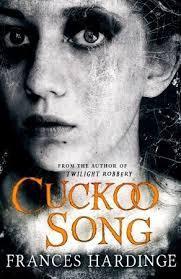 I've sung the praises of Frances Hardinge before, and will, I suspect, again. Hardinge is a YA writer, and her style is one I am perennially envious of: she has a rare gift for the English language, coupled with a fiendish imagination. Her latest is Cuckoo Song, and such is the nature of this book that — damn her! — I cannot really talk about it. It's set in the early 20th century, and the heroine wakes up after an illness to discover that everything around her — and within her — is going wrong in a genuinely creepy way (for Hardinge aficionados, this one is more Verdigris Deep territory than Fly By Night) . I can't say much more than that, as the finding out is the true joy of the book, but Hardinge does her usual dab hand at creating a world — both the real and the fantastical parts — and the urban fantasy elements have a particularly interesting slant. I wanted to talk about this book on at least two panels this year, but couldn't say much because I didn't want to spoil it. But I recommend it.
I've sung the praises of Frances Hardinge before, and will, I suspect, again. Hardinge is a YA writer, and her style is one I am perennially envious of: she has a rare gift for the English language, coupled with a fiendish imagination. Her latest is Cuckoo Song, and such is the nature of this book that — damn her! — I cannot really talk about it. It's set in the early 20th century, and the heroine wakes up after an illness to discover that everything around her — and within her — is going wrong in a genuinely creepy way (for Hardinge aficionados, this one is more Verdigris Deep territory than Fly By Night) . I can't say much more than that, as the finding out is the true joy of the book, but Hardinge does her usual dab hand at creating a world — both the real and the fantastical parts — and the urban fantasy elements have a particularly interesting slant. I wanted to talk about this book on at least two panels this year, but couldn't say much because I didn't want to spoil it. But I recommend it.
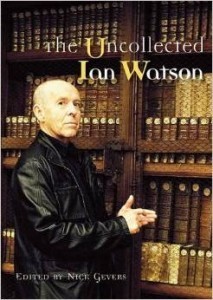 PS Publishing performs many useful functions in the book world — from its hardbound short story anthologies Postscripts, to taking a punt on something experimental like Tidhar's acclaimed Obama, to producing collections from some of the biggest and most respected names in SF. Last year I very much enjoyed their Paul McAuley collection, A Very British History, and this year they have produced The Uncollected Ian Watson. Ian — as well as being one of the most congenial people in the business — is a writer with an enormously long pedigree, a man who has helped shape the genre as we know it, and still going strong. This collection bringing together a wide-ranging selection of his work not previously netted, some of them stories relating to his most popular long fiction, together with some insightful essays about science and science fiction from a man who knows what he's talking about.
PS Publishing performs many useful functions in the book world — from its hardbound short story anthologies Postscripts, to taking a punt on something experimental like Tidhar's acclaimed Obama, to producing collections from some of the biggest and most respected names in SF. Last year I very much enjoyed their Paul McAuley collection, A Very British History, and this year they have produced The Uncollected Ian Watson. Ian — as well as being one of the most congenial people in the business — is a writer with an enormously long pedigree, a man who has helped shape the genre as we know it, and still going strong. This collection bringing together a wide-ranging selection of his work not previously netted, some of them stories relating to his most popular long fiction, together with some insightful essays about science and science fiction from a man who knows what he's talking about.
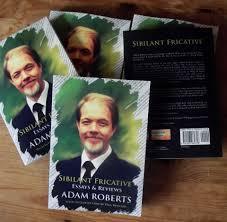 Another purveyor of insight is Adam Roberts, and my final thumbs up this time round goes not to one of his many superb novels, but to a collection of reviews from his website, Sibilant Fricative - meaning, if I have this right, not reviews actually on his blog Sibilant Fricative, but reviews from a previous website of his now released under the title of the new website, and in general following the theme of that website, but not actually… This is starting to sound a little like a Robertsian novel, actually. But anyway: Roberts as a reviewer is a hard, hard man. He does not at any point hold back in finding fault. He is also a very witty, entertaining writer, but at the same time his fault-finding manages to entertain without coming over as schadenfreude — a gift that some other SF writer/reviewers lack. The other side of the coin is, of course, that when Roberts gives something the nod, you can be assured of getting your dime's worth from it. Sibilant Fricative (the book(2)) is a fascinating medical examination of the genre's highs and lows over the years. Also, I love the image I've found for this one, which appears to show an angry mob of Sibilant Fricatives looking for a book to review.
Another purveyor of insight is Adam Roberts, and my final thumbs up this time round goes not to one of his many superb novels, but to a collection of reviews from his website, Sibilant Fricative - meaning, if I have this right, not reviews actually on his blog Sibilant Fricative, but reviews from a previous website of his now released under the title of the new website, and in general following the theme of that website, but not actually… This is starting to sound a little like a Robertsian novel, actually. But anyway: Roberts as a reviewer is a hard, hard man. He does not at any point hold back in finding fault. He is also a very witty, entertaining writer, but at the same time his fault-finding manages to entertain without coming over as schadenfreude — a gift that some other SF writer/reviewers lack. The other side of the coin is, of course, that when Roberts gives something the nod, you can be assured of getting your dime's worth from it. Sibilant Fricative (the book(2)) is a fascinating medical examination of the genre's highs and lows over the years. Also, I love the image I've found for this one, which appears to show an angry mob of Sibilant Fricatives looking for a book to review.
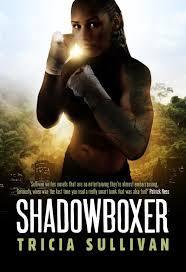 Finally, something I've not had a chance to read yet, but that I am very eagerly awaiting: along with Ian Watson and Adam Roberts, another great genre name to conjure with is Tricia Sullivan, whose mind-stretching Lightborn I greatly enjoyed a while back. Her new book, Shadowboxer, is due out on the 28th of this month, and looks to be a martial arts-based supernatural thriller. One to look out for.
Finally, something I've not had a chance to read yet, but that I am very eagerly awaiting: along with Ian Watson and Adam Roberts, another great genre name to conjure with is Tricia Sullivan, whose mind-stretching Lightborn I greatly enjoyed a while back. Her new book, Shadowboxer, is due out on the 28th of this month, and looks to be a martial arts-based supernatural thriller. One to look out for.
Tricia's Shadowboxer
(1) Always an added bonus talking about this book: it makes it sound as though poor Mr Collick has been dismembered.
(2) And the ongoing blog, for that matter.
Share this
September 30, 2014
The Fifth Iteration: first impressions of 5th ed D&D
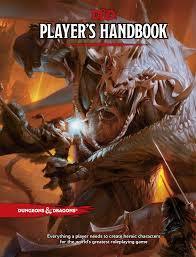 Firstly, if pen and paper RPGs are of no interest to you, then neither will this be. I'm gonna get old school geeky, and I'm not ashamed about it.
Firstly, if pen and paper RPGs are of no interest to you, then neither will this be. I'm gonna get old school geeky, and I'm not ashamed about it.
I don’t do reviews, of course, and these days I don’t honestly get to play tabletop RPGs much of at all, because everyone I know these days is grown up and their lives are made of scheduling clashes, as is mine.
But here is the 5th edition of Dungeons and Dragons and I’m looking at it, thinking ‘This can’t be right. I remember the 2nd ed coming out, surely not that long ago…”
Previously, for my money, I’d have said that the game peaked in the later iterations of 3rd ed (mostly in the form of 3.5 and Pathfinder). It’s probably not a very controversial opinion to say that 4th ed didn’t float my boat, playing out either like a very complicated board game ora sort of offline World of Warcraft clone (with tank specs, for example, and each class having a set of arbitrary abilities and cooldowns for which you could almost hear the buttons clicking) (1).
What does the 5th edition bring to the table, then? Who is it aimed at? Having now had a look at the first 2 rulebooks (Player’s Handbook and Monster Manual), the writers have pulled off a very clever little balancing act. I'd say it’s aimed both at veterans and beginners.
The thing is, how do you improve on (insert your favourite edition here(2))? What’s wrong with 3.5 or Pathfinder, say? Well, nothing, particularly. They are refined and comprehensive iterations of a long-loved game, the product of decades of thought about "how I would improve D&D". The main problem that situation will create, in my very subjective opinion, is one of complexity. There is a continuum in games design, with realism at one end and stylisation at the other, and most rules can be located somewhere along it. Some games go for a ruleset that doesn’t attempt to model the real world, but is designed specifically to provide very specific game systems — this can have a variety of effects, from freeing up player creativity to constricting it, but either way it doesn't attempt to use its numbers and dice rolls as a way of representing the world "on the ground". 4th ed was like this – it wasn’t very flexible, and it was very game-y and artificial (again, my opinion) – it came across as an encounter or skirmish simulator. 3rd ed was much more an attempt to model a fantasy world – and more and more so as it (and especially Pathfinder) accumulated additional rulebooks. This gives a high level player unparalleled flexibility – the choice of race, class, skills feats, spells, archetypes, etc. allows you to pull of any character you need. The problem is that, as time goes by, the amount of work this takes, and the amount of knowledge you need in order to do it, grows exponentially. I am one of those gamers who gain a great deal of joy finnicking with numbers and choices to get a character just so, but still, using these sorts of systems to their fullest can be exhausting, and if you do just make a bog-standard fighter, then you’re painfully aware that you’re not using 90% of what’s there.
5th ed is a lot more like 3rd than 4th– and thereby a lot more like 2nd and the sainted original of fond memory. It brings the game back into the sort of RPG territory that 4th ed only fit in uneasily. At the same time, though, it is presented simply and concisely. There is still choice, but things like feats are rationed, and in general creating a character is quick and simple, and still satisfying. Perhaps I might chafe for more options as far as the various class archetypes go – there are only 2 or 3 for most classes – but the ones they include are fun, and there’s very obviously a supplement waiting in the wings that can expand those without overly cluttering the basic systems of the game. And in the midst of all that reductionism, the writers still pull out some unusual choices – a nature paladin, magical fighter and rogue variants, and you can even have a dark pact with Cthulhu if that's your cup of green and steaming tea.
This covers the “newcomer” end of the scale then – the game is eminently pick-up-able and playable. The rules are all slimmed down and easy to grasp – for example instead of everything coming down to strings of modifiers to a die roll, which can be a nightmare to keep track of (3), the game has Advantage (roll twice, take best) and Disadvantage (roll twice, take worst) – and then most of the game simply works on that. Other effects grant bonus dice instead of flat bonuses, which, if no less complex, is generally more fun.
Where is the appeal to the long term player, then? Why do I feel strongly enough about it to be writing this? Aside from the very complete, rounded and user-friendly feel of the PHB, the game also has a strong nostalgia injection. Although it is its own game, it has a strong feel of the original, of recapturing the virtues of the early editions of the game – eg. those versions most of us were playing back in the halcyon days when we got a session every week and the streets were paved with d20s. There is a distinctly retro feel to the whole endeavour, in the best sense of the word, that is perfectly married with the elegant spin they’ve given the mechanics of the game.
The Monster Manual only strengthens this feel – a very carefully forged alloy of old and new. All the creatures there are going to be familiar to the long-term player – and in most cases the art (and the MM art is extremely good – I’m less sold on some of the PHB pieces) is very much in line with older interpretations of the creatures (the carrion crawler is a good case in point). At the same time, someone with an abiding love for the game has sat down and asked ‘why?’ for most of these creatures – most especially ‘why is this world so absurdly full of actively evil monsters’. So it is that most of the denizens of the MM come with at least a partial raison d’etre to explain why they’re troubling the world – and it’s not overdone, and nobody is being a goblin apologist, but it does give a certain depth and dimension to a lot of creatures that were previously little more than numbers on a page and a picture of a guy with the head of a hyena.
 Extra credit: the MM has a whole packed section of mundane and giant animals crammed in at the back, on the basis that you don’t really need to pay for the space that a picture of a goat or a giant spider would take up, just for the stats. Arcane spellcasters are now hard as nails from 1st level, rather than having to be carried by the rest of the party until around 5th. Famously, the section on character gender is explicitly accepting of non-cis possibilities. I have a few reservations – starter characters seem quite fragile compared to some of the damage figures that are flying around; druids have lost their animal companions and sorcerers seem a bit forlorn now that we have warlocks to be touched by dark powers, and now that wizards kick all sorts of ass. Kobolds got nerfed. But seriously, if that’s a reservation, you can hopefully tell how positive I am about the game.
Extra credit: the MM has a whole packed section of mundane and giant animals crammed in at the back, on the basis that you don’t really need to pay for the space that a picture of a goat or a giant spider would take up, just for the stats. Arcane spellcasters are now hard as nails from 1st level, rather than having to be carried by the rest of the party until around 5th. Famously, the section on character gender is explicitly accepting of non-cis possibilities. I have a few reservations – starter characters seem quite fragile compared to some of the damage figures that are flying around; druids have lost their animal companions and sorcerers seem a bit forlorn now that we have warlocks to be touched by dark powers, and now that wizards kick all sorts of ass. Kobolds got nerfed. But seriously, if that’s a reservation, you can hopefully tell how positive I am about the game.
Now I just need to find a chance to play it.
(1) As a surreal touch, the World of Warcraft RPG was still going at that point, and ran as a D&D game using 3rd ed rules. The mind boggles.
(2) Unless your favourite edition is 4th, in which case go stand in a corner.
(3) It was almost a round-by-round chorus in the most recent game I played in: "and another +1 for Bless"
Share this
September 17, 2014
Running to keep up
 OK so: a very hurried round-up of past crimes will have to suffice for this post: Fantasycon was great fun – I don’t know if it was the hotel (the Royal York) which was the fanciest of any con this year, and definitely superior to the place that the con was at for two consecutive years in Brighton (not the World Fantasy hotel, the other one from before). Lee Harris helmed the con – and MC’d it in place of poor Graham Joyce – very ably assisted by what seemed to be a small army of efficient ‘redcloak’ volunteers who seemed to keep everything ticking along nicely. I had a grand time, best Fantasycon so far, for me (being local probably helped of course). Highlights were the live Tea and Jeopardy where Emma and Peter Newman interviewed Toby Whithouse, Paul Cornell’s regular Just a Minute and a panel I was on (modestly I say it) on writing and fighting, which degenerated into a physical demo where I, Fran Terminiello, Juliet McKenna and Clifford Beal demonstrated our various styles, and Juliet did her best to remove my arm. There is a recording of this last part up on Youtube here, courtesy of my wife Annie, in which, among rather better tutors, I give a fairly inadequate gloss of the Lichtenauer school of longsword fighting.
OK so: a very hurried round-up of past crimes will have to suffice for this post: Fantasycon was great fun – I don’t know if it was the hotel (the Royal York) which was the fanciest of any con this year, and definitely superior to the place that the con was at for two consecutive years in Brighton (not the World Fantasy hotel, the other one from before). Lee Harris helmed the con – and MC’d it in place of poor Graham Joyce – very ably assisted by what seemed to be a small army of efficient ‘redcloak’ volunteers who seemed to keep everything ticking along nicely. I had a grand time, best Fantasycon so far, for me (being local probably helped of course). Highlights were the live Tea and Jeopardy where Emma and Peter Newman interviewed Toby Whithouse, Paul Cornell’s regular Just a Minute and a panel I was on (modestly I say it) on writing and fighting, which degenerated into a physical demo where I, Fran Terminiello, Juliet McKenna and Clifford Beal demonstrated our various styles, and Juliet did her best to remove my arm. There is a recording of this last part up on Youtube here, courtesy of my wife Annie, in which, among rather better tutors, I give a fairly inadequate gloss of the Lichtenauer school of longsword fighting.
 After that was Titancon over in Belfast, who were kind enough to invite me over. This was a lot of fun, and they looked after me splendidly (much thanks to Phil for organising, and Jo Playford for acting as author liaison). I got to meet SF legends Pat Cadigan and Ian McDonald, and fellow fantasy writers Laurence Donaghy, Peadar O Guilin and DJ McCune, we had a round of panels and a Family Feud-style quiz against some of the cast of Game of Thrones. Rounding off the evening was some truly inspired Karaoke, including a truly awe-inspiring Meatloaf and Pat performing Bad Romance.
After that was Titancon over in Belfast, who were kind enough to invite me over. This was a lot of fun, and they looked after me splendidly (much thanks to Phil for organising, and Jo Playford for acting as author liaison). I got to meet SF legends Pat Cadigan and Ian McDonald, and fellow fantasy writers Laurence Donaghy, Peadar O Guilin and DJ McCune, we had a round of panels and a Family Feud-style quiz against some of the cast of Game of Thrones. Rounding off the evening was some truly inspired Karaoke, including a truly awe-inspiring Meatloaf and Pat performing Bad Romance.
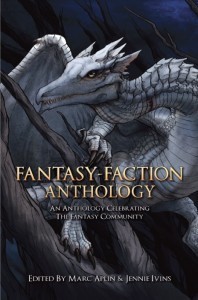 So, we’re done with cons until Bristol. Do I get any breathing room? Do I hell, frankly. However, In Other News, I’ve had a scattershot of new short stories fly into print recently. Those two reprobates Walther Cohen and Michael (from ‘The Dissipation Club’, ‘Pipework’ and ‘Lost Soldiers’ (1)) have had another couple of their exploits chronicled. ‘Where the Brass Band Plays’ can be found in The Alchemy Press Book of Urban Mythic 2, whilst my personal favourite, ‘The House on the Old Cliffs’ is at last out in the Fantasy Faction anthology – and believe me, if I hadn’t seen a copy of this at Fantasy at the Court I would have held it as a mere traveller’s tale.
So, we’re done with cons until Bristol. Do I get any breathing room? Do I hell, frankly. However, In Other News, I’ve had a scattershot of new short stories fly into print recently. Those two reprobates Walther Cohen and Michael (from ‘The Dissipation Club’, ‘Pipework’ and ‘Lost Soldiers’ (1)) have had another couple of their exploits chronicled. ‘Where the Brass Band Plays’ can be found in The Alchemy Press Book of Urban Mythic 2, whilst my personal favourite, ‘The House on the Old Cliffs’ is at last out in the Fantasy Faction anthology – and believe me, if I hadn’t seen a copy of this at Fantasy at the Court I would have held it as a mere traveller’s tale.
Also out is my frankly unpleasant story ‘The Girls from Humaji’ in Fox Spirit’s Girl at the End of the World volume 2. I think I must have been in a pretty dark place when I penned this one. For no readily explicable reason, Fox Spirit commissions bring out some weird and sharp-edged stuff from my imagination (see ‘Fragile Creations’ in Tales of Eve and my story in their upcoming Wicked Women antho).
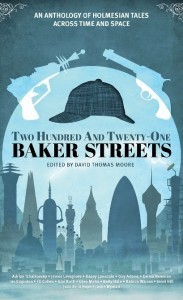 Finally, I am very, very proud to see my story ‘The Final Conjuration’ in Abaddon’s 221 Baker Streets, a collection of alt-world Sherlock Holmes stories. Of these new anthologies, this is the only one I’ve had a chance to read and – seriously, you should grab a copy as soon as it's readily available. Never mind my own offering, this is a set of beautiful and varied stories, far more so than you might think the shared theme might allow. I particularly liked Emma Newman's 'A Woman's Place', centring on a near-future Mrs Husdon's trials and tribulations, Guy Adams' 'A Study in Scarborough' which cast Holmes and Watson as a pair of Goons–style radio comedians, and Kaaron Warren's 'The Lantern Men' which frankly creeped me the hell out.
Finally, I am very, very proud to see my story ‘The Final Conjuration’ in Abaddon’s 221 Baker Streets, a collection of alt-world Sherlock Holmes stories. Of these new anthologies, this is the only one I’ve had a chance to read and – seriously, you should grab a copy as soon as it's readily available. Never mind my own offering, this is a set of beautiful and varied stories, far more so than you might think the shared theme might allow. I particularly liked Emma Newman's 'A Woman's Place', centring on a near-future Mrs Husdon's trials and tribulations, Guy Adams' 'A Study in Scarborough' which cast Holmes and Watson as a pair of Goons–style radio comedians, and Kaaron Warren's 'The Lantern Men' which frankly creeped me the hell out.
(1) In Feast and Famine from Newcon Press, Vivisepulture from Anarchy Press and 13 Ghosts of Christmas from Spectral, respectively.
Share this
August 29, 2014
Con-fabulation
That Adrian Tchaikovsky, all he does is post about conventions. Well yes,, that does seem to be the case just now, but mostly because all I do is go to them. Fantasycon, and then Titancon the week after, and then I get some breathing space before Bristol. Seriously, though, I have post ideas backing up. I want to do some more recommended reading, although the content of that is slowly being bloated out by all the good stuff I got at Loncon. I want to do a post about race fail in children's television. I want to do a post about worldbuilding and ecology in World of Warcraft. Would anyone actually want to read that? I mean, that's just crazy-talk right?
Anyway, if anyone is coming to Fantasycon 2014 in York (1), you can find me doing these things.
4pm Friday — The Great Big Tor Launchathon! Actually this was originally just Adam Nevill's launch for his new book No One Gets Out Alive — and in fact the very first opportunity for anyone to get copies of the book, I believe, but Adam is a very generous fellow and offered to share his spot with some fellow Tor authors, so I shall be there touting Seal of the Worm, Paul Cornell will have Severed Streets up for grabs, and Frank Tallis will have his The Voices.
11am Saturday — The Pen vs The Sword — a panel where I, Juliet McKenna, Clifford Beale, Stephen Aryan and Fran Terminiello talk about fight craft and translating it onto the page. Apparently there may be demonstrations. Juliet McKenna is noteworthy for having thrown Joe Abercrombie across a room once. Don't fancy my chances.
1pm Saturday — Abaddon Launch — Abaddon are launching their alt-world Sherlock Holmes anthology 221 Baker Streets in which I have a brand new story.
2pm Saturday — It Ain't Half Grimdark Mum — no, sorry, Beyond Grimdark. A popular panel topic for this year. Is it Mo'grimmer, Mo'darker, or is there a light at the end of the grim tunnel? Joining me in the shadows will be David Moore, Martin Taylor, Jen Williams and James Oswald.
3.40pm Saturday — my reading slot! I shall be doing a super secret sneak peak of Guns of the Dawn plus probably a very short story.
2.30pm Sunday — British Fantasy Awards, God help me.
(1) I told my fight class about this; they were mightily impressed. Turned out they thought I meant New York.
Share this

